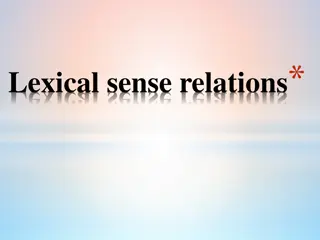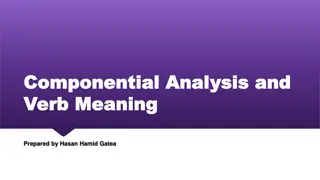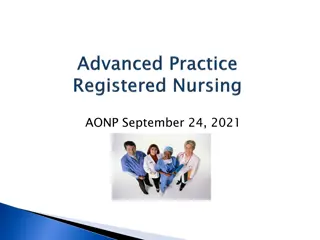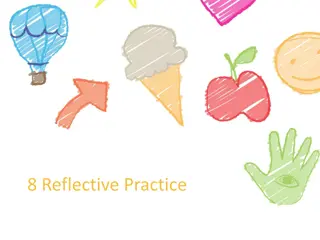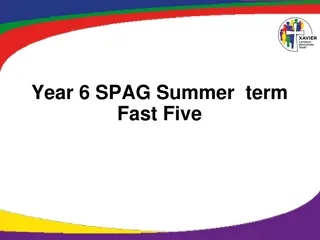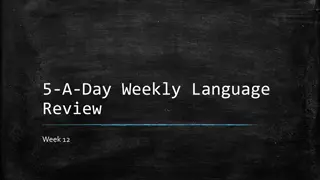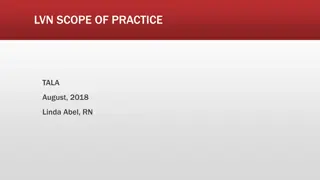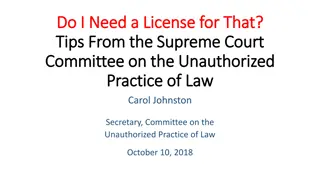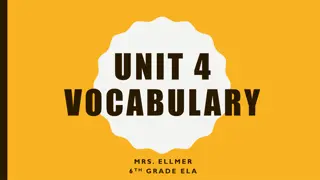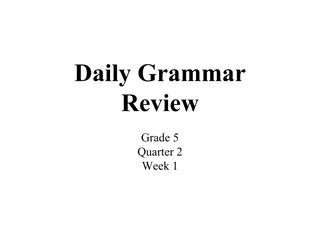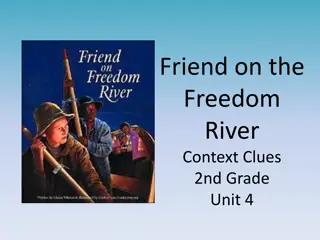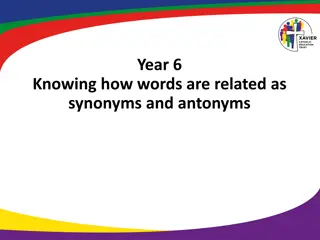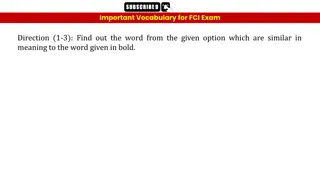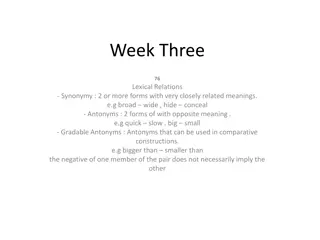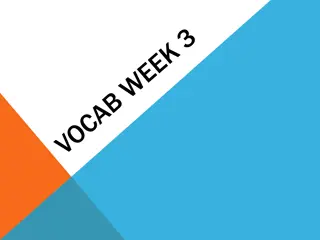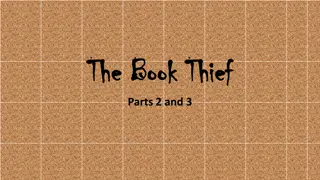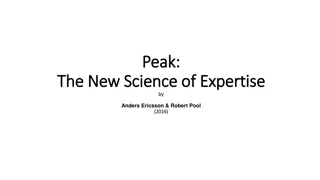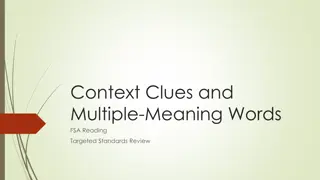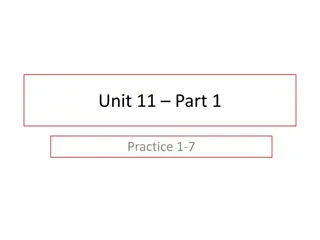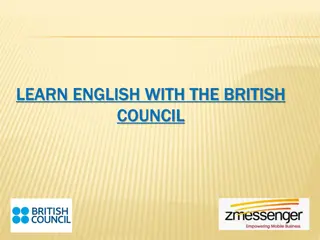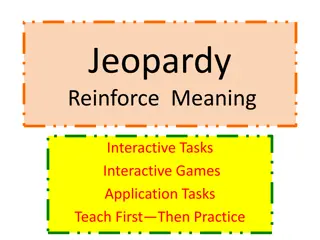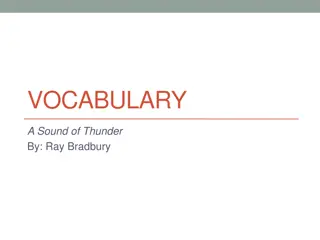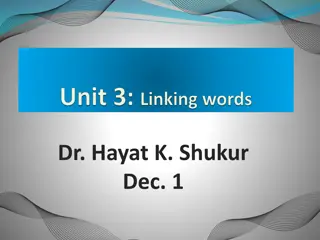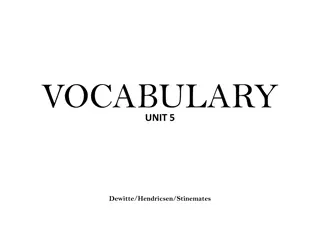Competencies and Scope of Practice for Registered Nurses in New Zealand
The Competencies and Scope of Practice for Registered Nurses in New Zealand focus on regulating nursing practice to ensure public safety. Registered Nurses are expected to utilize nursing knowledge and judgment to assess health needs, provide care, and support individuals in managing their health. T
4 views • 25 slides
Nursing and Midwifery Practice Placement Allocations Office Orientation
The Practice Placement Allocations Office (PPAO) ensures students gain experience in specific practice placement areas required for registration by the Nursing and Midwifery Board of Ireland. The BSc programmes include theory and practice placements, aiming for professional registration with NMBI. P
1 views • 16 slides
Enhancing Literary Comprehension Through Interactive Learning Activities
Engage students in a dynamic English class led by Senior Teacher Jahangir Alam. Dive into the world of Count Wisely with interactive lessons, vocabulary exercises, and engaging storytelling. Explore the power of words with synonyms, antonyms, and sentence structures. Foster a deep understanding of l
7 views • 20 slides
Understanding Lexical Sense Relations and Word Meanings
Investigating sense relations between words involves exploring synonyms, antonyms, hyponymy, and meronymy to understand the meanings of words in different contexts. By examining semantic similarities and syntactic relationships, one can better comprehend how words relate to one another, leading to a
1 views • 28 slides
Understanding Componential Analysis in Semantics
Componential analysis is a significant theory that emerged in the 20th century to analyze words based on semantic features. It helps identify word meanings by examining components and their features. This method involves representing features as either positive (+), negative (-), or unspecified (.).
0 views • 22 slides
Understanding Vocabulary through Context Clues
Learn how to decipher unfamiliar words by identifying context clues such as definitions, synonyms, antonyms, and comparisons. Examples and visual aids demonstrate how these clues help in understanding the meaning of unknown words in sentences.
0 views • 17 slides
Understanding Lexical Relations: Synonyms, Antonyms, Hyponymy, and Prototype
Explore the concepts of synonyms, antonyms, hyponymy, and prototype in lexical relations. Learn how closely related words can be substituted for each other, understand opposites, inclusion in meanings, and characteristic instances in word categories.
0 views • 12 slides
Overview of APRN Regulation and Practice in Oklahoma
This content delves into the regulation and practice of Advanced Practice Registered Nurses (APRNs) in Oklahoma. It covers who regulates nursing practice, the roles and populations of APRNs, examination of laws related to CNP practice, approved certifications for APRN licensure, and updated legislat
0 views • 33 slides
Advanced Clinical Practice Framework and Pillars of Practice
The document discusses the advanced clinical practice framework and the four pillars of practice which include leadership & management, clinical practice, education, and research. It emphasizes the importance of core capabilities and area-specific competence in advanced clinical practice. The role o
2 views • 8 slides
Enhancing Professional Practice through Reflective Practice
Reflective practice is an essential ongoing process in professional practice with children and families. It involves honest, deep, and critical thinking to improve outcomes, challenge assumptions, and seek collaboration. Through reflective practice, educators can recognize good practices, address ch
0 views • 35 slides
Enhancing Vocabulary with Antonyms Guide
Explore the world of antonyms and learn how they enrich our language. Discover the power of identifying and using antonyms to enhance your vocabulary and writing skills. Uncover the importance of opposites in expanding your language proficiency and mastering English.
0 views • 11 slides
Enhancing Vocabulary Skills Through Synonyms and Antonyms Practice in English
Explore a series of passages focusing on enhancing vocabulary skills by identifying synonyms and antonyms in English language usage. Engage with exercises that challenge your understanding and application of word meanings, offering insights into expanding your linguistic proficiency. Practice contex
0 views • 12 slides
Year 6 SPAG Summer Term Fast Five Activities
This resource covers various language activities for Year 6 students including adding prefixes and suffixes, using words in different forms, identifying pronouns, synonyms, antonyms, punctuation, plurals, and correcting spellings. It also includes answers for self-assessment.
0 views • 34 slides
Understanding Antonyms: Types and Examples
Antonyms are words with opposite meanings, such as alive/dead, big/small, and happy/sad. They are categorized into gradable and non-gradable types, each serving distinct linguistic functions. While gradable antonyms can be used comparatively, non-gradable antonyms do not allow for such comparisons.
0 views • 34 slides
Weekly Language Review Week 12
This week's language review includes exercises on simplifying sentences, identifying misspelled words, understanding figures of speech, and differentiating between phrases, independent clauses, and dependent clauses. It also covers definitions, word roots, eliciting responses, punctuation, and anton
0 views • 20 slides
Understanding LVN Scope of Practice in Texas
Explore the role of the Board of Nursing, review LVN Scope of Practice, differentiate between RN and LVN nursing practice, and consider models for safe LVN practice in Alabama. Learn about the history and purpose of the Board of Nursing, standards of nursing practice for all nurses, and specific res
0 views • 38 slides
Understanding the Practice of Law and Licensing Requirements
Exploring the practice of law, the unauthorized practice of law, the public interest considerations, and the activities that constitute legal practice according to the Supreme Court Committee on the Unauthorized Practice of Law. It delves into the essential aspects of legal profession, defining lega
0 views • 35 slides
Understanding Antonyms: Types and Examples
Antonyms are words with opposite meanings, such as alive/dead, big/small, hot/cold. They are categorized as gradable or non-gradable based on their usage. Gradable antonyms can be compared, while non-gradable antonyms do not allow for comparison. The negative test helps identify non-gradable antonym
2 views • 34 slides
Understanding Global Warming Impacts in English Class Lesson
In this English class lesson, students learn about the dangers of global warming and its impact on the world. They study how extreme heat is melting ice, leading to rising sea levels and potential future flooding of land. The lesson covers topics such as the effects of climate change on food product
0 views • 12 slides
Unit 4 Vocabulary - Mrs. Ellmer 6th Grade ELA
Explore key vocabulary words from Unit 4 in Mrs. Ellmer's 6th-grade English Language Arts class. Learn the definitions, synonyms, and antonyms of words like "acquit," "deem," "devastate," "discredit," "elusive," "generate," "idolize," and "ingratitude" with visual aids for better understanding.
0 views • 21 slides
Grade 5 Quarter 2 Week 1 Daily Grammar Review
Engage in daily grammar practice with exercises focusing on sentence structure, word order, rhyming words, homophones, prepositional phrases, synonyms, antonyms, adverbs, dates, and identifying parts of speech. Improve your grammar skills progressively through the week.
0 views • 60 slides
Understanding Context Clues for Word Meaning
Explore the concept of context clues in understanding the meanings of words and phrases, with examples and explanations of synonyms, antonyms, and more. Enhance your vocabulary skills by learning how to infer word meanings based on surrounding text.
0 views • 12 slides
Enhancing Writing Skills with Synonyms and Antonyms
Explore the importance of synonyms and antonyms in improving writing skills by understanding how words are related, with examples and exercises provided to practice identifying synonyms and antonyms. Discover the power of vocabulary expansion through word relationships.
0 views • 7 slides
Important Vocabulary for FCI Exam - Synonyms and Antonyms Practice
Enhance your vocabulary skills for the FCI exam with practice questions on synonyms and antonyms. Test your understanding of words like Embedded, Contemplate, and Disproportionate by finding similar or opposite meanings to improve your word knowledge.
0 views • 109 slides
Understanding Lexical Relations in Linguistics
Different types of lexical relations such as synonymy, antonyms, hyponymy, homophony, and homonymy play a crucial role in understanding the nuances of language. Synonyms have closely related meanings, antonyms have opposite meanings, while hyponymy and hypernymy show hierarchical relationships betwe
0 views • 4 slides
Understanding Practice Drift in Nursing: Risks and Consequences
Explore the concept of practice drift in nursing, where nurses may deviate from standards leading to unsafe practice. Learn how to identify and prevent practice drift, understand scope of practice, and adhere to state regulations. Discover the importance of following the Model Nurse Practice Act and
0 views • 35 slides
Unveiling Polarity with Polarity-Inducing Latent Semantic Analysis
Polarity-Inducing Latent Semantic Analysis (PILSA) introduces a novel vector space model that distinguishes antonyms from synonyms. By encoding polarity information, synonyms cluster closely while antonyms are positioned at opposite ends of a unit sphere. Existing models struggle with finer distinct
1 views • 29 slides
Understanding Lexical Relations in Language
Explore the concepts of synonymy, antonymy, hyponymy, and prototype in linguistics. Learn about words with closely related meanings (synonyms), opposite meanings (antonyms), inclusive meanings (hyponyms), and characteristic examples (prototypes) within lexical relations.
0 views • 12 slides
Vocabulary Study - Words and Definitions
This study guide provides definitions, parts of speech, synonyms, antonyms, and sentences for the words "admonish," "breach," "brigand," and "circumspect." Learn the meanings of these words and enhance your vocabulary skills for homework or personal development.
0 views • 22 slides
Learning Vocabulary with Visual Examples
Explore vocabulary words such as "ordinary," "control," "cage," "upset," "sensible," "confused," "training," and "suspiciously" through engaging visual examples. Enhance your understanding of each word's meaning, synonyms, antonyms, and usage in sentences.
0 views • 9 slides
Vocabulary Enrichment with Visual Aid
Enhance your vocabulary with visual representations of words like "flippant," "culminate," "prolific," "agitation," "animosity," "transgressor," "benign," and "pensive." Each word is paired with its definition and antonyms, making learning engaging and effective.
0 views • 9 slides
Mastering Skills Through Purposeful Practice
Mastering skills, such as perfect pitch in music, requires purposeful and deliberate practice from a young age. The brain's adaptability diminishes after six years old, emphasizing the importance of early training. Effective practice involves setting specific goals, receiving feedback, and pushing b
0 views • 23 slides
Understanding Context Clues for Effective Reading Comprehension
Context clues are hints within a text that assist readers in understanding the meaning of unfamiliar words. They can be found in definitions, surrounding sentences, synonyms, antonyms, and cause-and-effect relationships. By recognizing and utilizing context clues, readers can enhance their comprehen
0 views • 15 slides
Understanding Analyticity and Antonymy Concepts
Explore concepts like analyticity, paraphrases, antonymy, and binary antonyms in this practice exercise. Learn about sense relations, contradictory statements, and word opposites. Dive into identifying binary antonyms and understanding four-way contrasts. Enhance your understanding of semantics and
0 views • 39 slides
Collaborative Strategies for Advancing DNP Education and Practice
The comprehensive discourse covers gathering resources for a statewide initiative on DNP education and practice, effectiveness of collaborative discussions between academia and practice, and outcomes of bridging education and practice. It also emphasizes the purpose of uniting education and practice
0 views • 30 slides
Explore Language Learning with the British Council SMS Service
Learn English with the British Council through their innovative SMS-based language learning tool, a collaboration between zMessenger and the British Council. Delve into grammar, sentence usage, synonyms/antonyms, and translations in Sinhala or Tamil. Receive push SMS messages with learning tips and
0 views • 18 slides
Vocabulary Building Interactive Challenge
Engage in an interactive Jeopardy-style game to reinforce your understanding of antonyms, synonyms, root words, and parts of speech. Test your knowledge by identifying antonyms like "common people" for "royalty" and determining the root words of words like "celebrity" and "poverty." Enhance your lan
0 views • 14 slides
Understanding Context Clues for Vocabulary Enrichment
Context clues are essential in deciphering unfamiliar words within a text. By recognizing synonyms, antonyms, explanations, and examples provided by the author, readers can gain a deeper understanding of challenging vocabulary terms. Knowing how to leverage context clues enhances comprehension and p
0 views • 26 slides
Vocabulary and Grammar Exercises for Language Development
Enhance your language skills with exercises focusing on linking words, parallel structure, and antonyms formed with prefixes. Engage in activities to practice using "because" and "even though," and explore vocabulary development through prefixes to discover antonyms. Improve your understanding of En
0 views • 10 slides
Expand Your Vocabulary: Unit 5 Word Definitions and Examples
Enhance your language skills by learning a variety of new words from Unit 5 of the Dewitte/Hendricsen/Stinemates vocabulary list. This collection provides definitions, synonyms, antonyms, and visual aids for each word, aiding in better comprehension and retention of the material.
0 views • 22 slides



